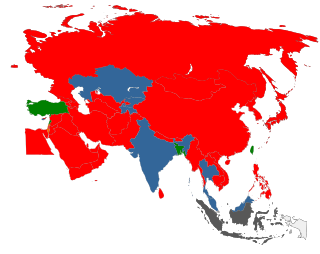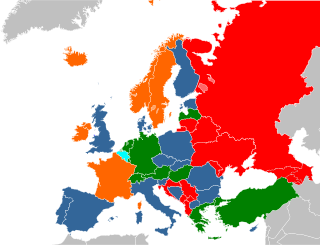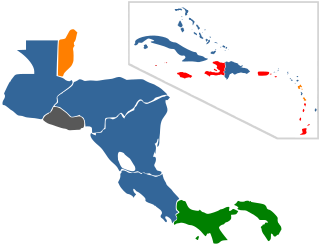| Blockade of the Gaza Strip |
|---|
| Crossings |
| 2004 - 2009 |
| 2010 |
|
| 2011 - present |
| Groups involved |
Human trafficking in the Palestine has been observed and reported by numerous[ citation needed ] sources.
In December 2009, a 26-page report was published by SAWA, from United Nations Development Fund for Women (UNIFEM), [1] which included that there is a lack of data collection on human trafficking in Palestine. [2] The report calls on Palestinian governmental organizations to establish new legislation that should guarantee that females are treated as victims of crime and not offenders. [1]
Vast poverty and lack of economic scope have been cited as major factors in human trafficking in the Palestinian territories. Other activities includes sex exploitation and child labor. [3]
Child sex tourism (CST) is tourism for the purpose of engaging in the prostitution of children, which is commercially facilitated child sexual abuse. The definition of child in the United Nations Convention on the Rights of the Child is "every human being below the age of 18 years". Child sex tourism results in both mental and physical consequences for the exploited children, which may include sexually transmitted infections, "drug addiction, pregnancy, malnutrition, social ostracism, and death", according to the State Department of the United States. Child sex tourism, part of the multibillion-dollar global sex tourism industry, is a form of child prostitution within the wider issue of commercial sexual exploitation of children. Child sex tourism victimizes approximately 2 million children around the world. The children who perform as prostitutes in the child sex tourism trade often have been lured or abducted into sexual slavery.
Child prostitution is prostitution involving a child, and it is a form of commercial sexual exploitation of children. The term normally refers to prostitution of a minor, or person under the legal age of consent. In most jurisdictions, child prostitution is illegal as part of general prohibition on prostitution.

Sex trafficking is human trafficking for the purpose of sexual exploitation. Perpetrators of the crime are called sex traffickers or pimps—people who manipulate victims to engage in various forms of commercial sex with paying customers. Sex traffickers use force, fraud, and coercion as they recruit, transport, and provide their victims as prostitutes. Sometimes victims are brought into a situation of dependency on their trafficker(s), financially or emotionally. Every aspect of sex trafficking is considered a crime, from acquisition to transportation and exploitation of victims. This includes any sexual exploitation of adults or minors, including child sex tourism (CST) and domestic minor sex trafficking (DMST). It has been called a form of modern slavery because of the way victims are forced into sexual acts non-consensually, in a form of sexual slavery.

The legality of prostitution in Asia varies by country. There is often a significant difference in Asia between prostitution laws and the practice of prostitution. In 2011, the Asian Commission on AIDS estimated there were 10 million sex workers in Asia and 75 million male customers.
Forced prostitution, also known as involuntary prostitution or compulsory prostitution, is prostitution or sexual slavery that takes place as a result of coercion by a third party. The terms "forced prostitution" or "enforced prostitution" appear in international and humanitarian conventions, such as the Rome Statute of the International Criminal Court, but have been inconsistently applied. "Forced prostitution" refers to conditions of control over a person who is coerced by another to engage in sexual activity.
International human rights organizations, along with the United Nations, and the United States Department of State, have reported human rights violations committed by the State of Israel, particularly against minority groups. These reports include violations of the rights of Palestinians, both inside and outside Israel as well as other groups in Israel.

Prostitution is a type of sex work that involves engaging in sexual activity in exchange for payment. The definition of "sexual activity" varies, and is often defined as an activity requiring physical contact with the customer. The requirement of physical contact also creates the risk of transferring infections. Prostitution is sometimes described as sexual services, commercial sex or, colloquially, hooking. It is sometimes referred to euphemistically as "the world's oldest profession" in the English-speaking world. A person who works in the field is usually called a prostitute or sex worker, but other words, such as hooker and whore, are sometimes used pejoratively to refer to those who work in prostitution. The majority of prostitutes are female and have male clients.

Sex workers' rights encompass a variety of aims being pursued globally by individuals and organizations that specifically involve the human, health, and labor rights of sex workers and their clients. The goals of these movements are diverse, but generally aim to legalize or decriminalize sex work, as well as to destigmatize it, regulate it and ensure fair treatment before legal and cultural forces on a local and international level for all persons in the sex industry.

Homosexuality in the Palestinian territories is considered a taboo subject; lesbian, gay, bisexual, transgender, and queer (LGBTQ) people experience persecution and violence. There is a significant legal divide between the West Bank and the Gaza Strip, with the former having more progressive laws and the latter having more conservative laws. Shortly after the Jordanian annexation of the West Bank in 1950, same-sex acts were decriminalized across the territory with the adoption of the Jordanian Penal Code of 1951. In the Egyptian-occupied Gaza Strip and under Hamas' rule, however, no such initiative was implemented.
Prostitution in the State of Palestine is illegal, under Palestinian law.

The legality of prostitution in Europe varies by country.

Human trafficking is the act of recruiting, transporting, transferring, harboring, or receiving individuals through force, fraud, or coercion for the purpose of exploitation. This exploitation may include forced labor, sexual slavery, or other forms of commercial sexual exploitation. It is considered a serious violation of human rights and a form of modern slavery. Efforts to combat human trafficking involve international laws, national policies, and non-governmental organizations.
Human trafficking in Israel includes the trafficking of men and women into the country for forced labor and sex slavery. The country has made serious efforts to reduce the problem in recent years and now ranks 90th out of 167 countries who provide data. Identification of victims, criminal justice work and efforts to co-ordinate with business and government agencies has been concerted in reducing this problem in the last decade.

The legal status of prostitution in Africa varies widely. It is frequently common in practice, partially driven by the widespread poverty in many sub-Saharan African countries, and is one of the drivers for the prevalence of AIDS in Africa. Senegal and Côte d'Ivoire permit the operations of brothels. In other countries, prostitution may be legal, but brothels are not allowed to operate. In some countries where prostitution is illegal, the law is rarely enforced.

Prostitution laws varies widely from country to country, and between jurisdictions within a country. At one extreme, prostitution or sex work is legal in some places and regarded as a profession, while at the other extreme, it is considered a severe crime punishable by death in some other places. A variety of different legal models exist around the world, including total bans, bans that only target the customer, and laws permitting prostitution but prohibiting organized groups, an example being brothels.
Prostitution in Cambodia is illegal, but prevalent. A 2008 Cambodian Law on Suppression of Human Trafficking and Sexual Exploitation has proven controversial, with international concerns regarding human rights abuses resulting from it, such as outlined in the 2010 Human Rights Watch report.

The Jerusalem Institute of Justice (JIJ) is a nonprofit human rights organization operating in Israel. JIJ advocates human rights and civil justice, advocates in the Courts of Israel, the Israeli Knesset, international governments, academia and mainstream media forums in Israel and across the globe. The institute assists weakened populations, such as Holocaust survivors, women, men and children that are trapped in the sex industry, IDF soldiers with no homes or families, and religious and ethnic minority groups. The Institute was founded in 2004 and since then has handled over 1000 cases dealing with religious freedom in Israel.

Legality of prostitution in the Americas varies by country. Most countries only legalized prostitution, with the act of exchanging money for sexual services legal. The level of enforcement varies by country. One country, the United States, is unique as legality of prostitution is not the responsibility of the federal government, but rather state, territorial, and federal district's responsibility.

The Nordic Model approach to sex work, also marketed as the end demand, equality model, neo-abolitionism, Nordic and Swedish model, is an approach to sex work that criminalises clients, third parties and many of the ways sex workers operate. This approach to criminalising sex work was developed in Sweden in 1999 on the debated radical feminist position that all sex work is sexual servitude and no person can consent to engage in commercial sexual services. The main objective of the model is to abolish the sex industry by punishing the purchase of sexual services. The model was also originally developed to make working in the sex industry more difficult.

Crime in the State of Palestine is present in various forms which include theft, drug trafficking, arms trafficking, burglary, human trafficking and terrorism.